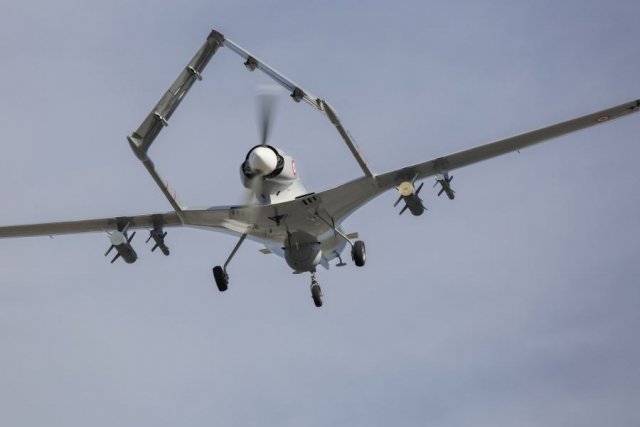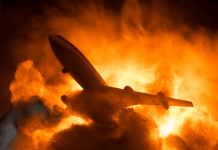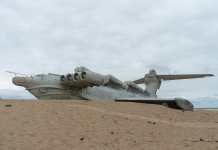Turkey has refuted reports suggesting autonomous firing by its indigenous Kargu-2 drones, currently being used in the Libyan civil war.
In March, a UN Security Council report made headlines around the world, alleging that Turkey-manufactured Kargu-2 drone attacked soldiers fighting in Libya without “human control”.
The Kargu-2 is an unmanned aerial vehicle (UAV) developed by STM, a Turkish state-owned defense company.

“The lethal autonomous weapons systems were programmed to attack targets without requiring data connectivity between the operator and the munition: in effect, a true “fire, forget and find” capability,” the report noted.
However, STM’s CEO, Ozgur Guleryuz has denied the use of autonomous technology to attack targets, stressing upon “a manual operator pressing a button” which can be canceled any time before the drone carries out the attack, as reported by Nikkei Asia.
AI-Powered Combat Drones
The Kargu-2 (also called Eurasian Sparrowhawk in Turkey), is a rotary-wing combat UAV (UCAV) designed for asymmetric warfare or anti-terrorist operations, as per STM’s website.
A combat drone has warhead-carrying capabilities and can be equipped with missiles and bombs. Apart from Turley, the US, China and Iran are leading developers of AI combat drones.
It is available in both autonomous and manual modes. Guleryuz has shown confidence in exporting the UCAV overseas, especially to Asia.
Other countries have produced assault variants of existing drone systems such as the Israeli Hermes 450 and UK-based BAE Taranis.
India is also in the race to develop Ghatak, a stealth UCAV, for the Indian Air Force. The first flight test of the DRDO-built drone is scheduled for 2021.
A rogue killer drone 'hunted down' a human target without being instructed to, UN report says | Business Insiderhttps://t.co/8QftMDbLOR
— WikiLeaks (@wikileaks) June 1, 2021
The development comes amid a rise in the use of autonomous lethal weapons, where AI technology is used to attack a target with the purpose of elimination without any human discretion.
Refuting the reports, Guleryuz said that autonomous technology is used only for “navigational purposes and differentiating humans, animals, vehicles”.
“Autonomous technologies are advancing so fast, but we are not there yet. At STM, we always think ethically a human should be involved in the loop,” he added.
Report: Kargu-2 drone may have “hunted down and remotely engaged” soldiers in Libya last year. Bulletin of the Atomic Scientists says this could be first known case of AI-based autonomous weapons being used to kill https://t.co/UaVsxhfK9b
— science (@science) May 28, 2021
Meanwhile, Turkey is in the process of developing another combat drone called ‘Alpagu’, a lightweight model that can be carried and operated by a single soldier on the battlefield.
A Drone Superpower
The Turkish drone industry took off in the early 2000s with its first indigenous drone, the Anka. Despite several crash landings and criticisms on the use of foreign parts in the supposedly ‘indigenous’ drone, Turkey became a major producer and exporter of Anka drones.
In 2011, in a major breakthrough for the drone industry, the Turkish defense department partnered with a private joint venture, Kale-Baykar, for the development of Bayraktar TB-2 armed drones.
In service since 2014, the TB-2 drone system has been at the forefront of Turkey’s fight against Kurdish militants in southern parts of the country, bordering Iraq and Syria.

The TB-2 has made a mark in the global arms exports of UAVs; its buyers include Qatar, Ukraine, Poland, Morocco, and Azerbaijan, which used it in the recent Nagorno-Karabakh conflict with Armenia.
In April, Canada suspended the sale of advanced drone technology to Turkey, accusing it of using Canadian-manufactured equipment to aid Azerbaijan, Turkey’s close ally against Armenian forces.
In 2018, Turkey produced Anka-S and Aksungur, both built by Turkish Aerospace Industries (TAI) for long-term surveillance, signals intelligence, maritime patrol missions. Anka-S is the first variant of Anka with satellite control capability.
READ MORE
- Watch: The Ultimate Dogfight Between US & Russian Fighter Jets Over A ‘Top-Secret’ Air Base In Nevada
- Why India’s Ladakh Region Is Crucial For China’s Rise As An Economic Super-Power?
- 30 Times Faster Than Speed Of Sound: Is China Really Winning The Hypersonic Race With Its JF-22 Wind Tunnel?




